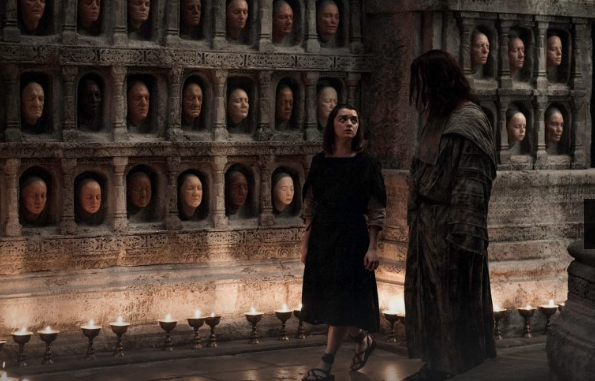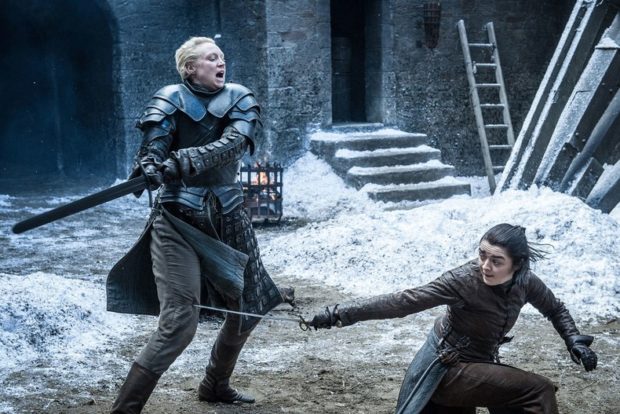Game of Thrones and economics: Arya’s got skillz
[Editor’s note: This article contains spoilers to “Game of Thrones.”]
WASHINGTON — What does it take to kill the Night King?
Definitely not a pair of fire-exhaling dragons. The Night King turns out to be flame retardant.

This image released by HBO shows Maisie Williams in a scene from “Game of Thrones,” that aired Sunday, April 28, 2019. Image: Helen Sloan/HBO via AP
Nor does the ability to loop through time and assume control of ravens’ brains help much. Bran Stark pretty much sat helpless beneath the Weirwood tree, waiting to be rescued in a way that was no different than a damsel tied to train tracks in a silent film.
Past experience dueling the Night King provided to be of little help. Jon Snow — after multiple showdowns with the blue-ish personification of cold death — was pinned down far away from the action by the Night King’s own “ice” dragon.
In the Associated Press’ weekly “Wealth of Westeros” series, we’re following the HBO fantasy show’s latest plot twists and analyzing the economic and business forces driving the story. This week, Arya’s triumphant assassination of the king ice zombie has prompted an appreciation among us for the role of skills, in economics as well as medieval Westeros.
Article continues after this advertisementBecause — SPOILER ALERT — it took skills to kill the Night King.
Article continues after this advertisementArya Stark stabbed the Night King into a shattered death. As he held her aloft in a choke hold, Arya deftly dropped a Valyrian steel knife into her free hand and plunged the blade into the Night King’s surprisingly brittle chest.
Arya trained for this precise moment for almost the entire duration of the HBO series. It was the kind of outcome that few fans of the show foresaw, unless they internalized the lessons of the 18th Century philosopher Adam Smith, who is known as the “father of economics.”
In his 1776 book “The Wealth of Nations,” Smith theorized that the ability to specialize in a distinct set of skills will lead to stronger economic growth. Skilled blacksmiths, tailors, lawyers, doctors, bankers and software programmers not only work more quickly, but they produce a better product. Getting skills requires a combination of time, training and teachers.
This was Arya’s advantage.
She took fencing lessons in King’s Landing with Syrio Forel (RIP). Orphaned and alone after Ned Stark’s death in the first season, she mastered the art of hiding in plain sight.
Arya then sailed east to study how to become an assassin under the tutelage of the faceless men at the House of Black and White. She trained on the long-staff against the cruel waif, learning how to fight while blindfolded.

Arya Stark and Jaqen H’gar. HBO PHOTO
Just before the battle of Winterfell, she commissioned a special staff with a detachable blade in order to compete against the Night King’s army. And careful viewers saw her dagger move against the Night King before when Arya was mock-fighting Brienne of Tarth in the seventh season.

Image: HBO/Helen Sloan
Arya’s time spent learning closely resembles what economists see as one of the best job training methods available: an apprenticeship. The benefits of apprenticeships — in which companies pay workers, typically younger ones, to learn highly-specific skills — have been touted by both the Trump and Obama administrations, a rare area of bipartisan agreement.
Roughly 90% of apprentices have jobs after completing their apprenticeships, with average starting pay of more than $50,000, according to a 2015 report by the Obama White House.
Naturally, the unemployment rate is lower for workers who are perceived as having more skills. Just 2% of college graduates are unemployed, almost half the rate of people with only a high school diploma.
But the United States isn’t investing sufficiently in skills training, even though such a move is touted as conventional wisdom by business and political leaders. A report by the Organization for Economic Cooperation and Development found that, out of 29 developed countries, the United States spent the second-least amount on training programs, as a percentage of its economy, ahead of only Mexico.
It wasn’t always that way.
History also shows that, like Arya Stark, skills can help when circumstances get terrible. During the depths of the Great Depression, productivity increased and laid the foundation for an economy that could meet the demands of World War II and then boom afterward.
“The resilience of (productivity) growth in the 1930s reflected U.S. success in creating a strong ‘national innovation system’ based on world-leading investments in human capital and R&D,” the economists Gerben Bakker, Nicholas Crafts and Pieter Woltjer concluded in a 2016 paper.
It’s the unique skills possessed by Arya and others that might make the difference in the battle to come over control with Westeros. Queen Cersei may have 20,000 mercenaries serving as fresh troops against the battered survivors of the Battle of Winterfell. But … can any of them be stealth assassins? NVG
RELATED STORIES:
Maisie Williams thought fans would hate Arya in Winterfell battle